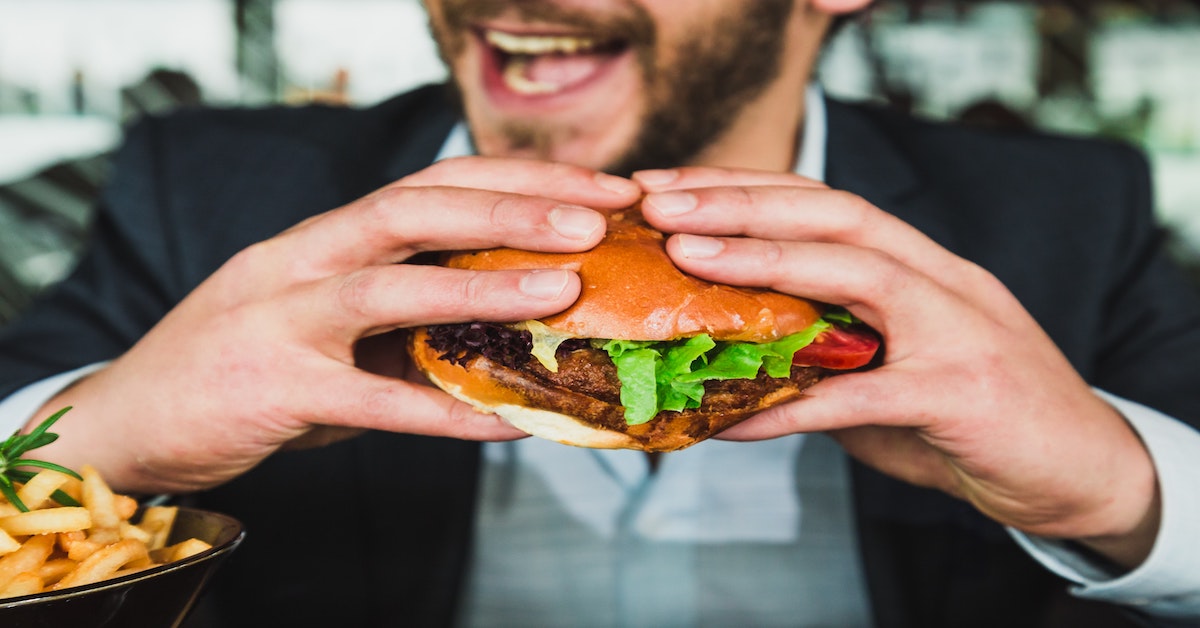Have you been gaining fat recently? There could be numerous things that can be causing you to gain fat.
Sometimes, when you want to change something or solve a challenge, you might need to understand the ‘what’ of the topic in question. For instance, what could you have been doing to make you gain fat? Finding out some of the reasons associated with this question can help you understand the possible causes of why you are gaining fat.
Following the ‘what’ questions, the ‘why’ questions often follow up that helps you go further into the topic and lead to finding some ways to lose fat. By understanding what possible things that you could be doing to gain fat, you can either avoid or reduce the number of things that you have been doing to gain fat to lose fat. It can be pretty important if your goal is to lose fat that you understand what is causing you to gain fat in the first place.
Misinterpreted Understanding Of Healthy Diet

It is so easy to get confused about what exactly a healthy diet can be when you are eating out or when you don’t know the complete list of ingredients and don’t have enough time in general to calculate your diet. You might be misinterpreting the concept of a healthy diet, and you might be thinking that you are eating healthy food such as salad and sandwiches with some vegetables;
However, the healthy food you might be thinking about might not be healthy enough as you expect because the salad can have dressings, and dressings could have sugar, salt, and other ingredients you may be trying to avoid. Also, your submarine sandwich, or some call it sub, might have a good amount of vegetables, but the bread might have the ingredients you are trying to reduce or avoid.
You could be doing things that make you gain fat by consuming what you could be trying to reduce or avoid, such as sugar and salt from what you perceived as healthy food. If you are making an effort to eat healthy by intaking salad but using dressing sauce, it can still be great but with some adjustments.
You can use the replacing method to change less healthy options to a healthier ones. For instance, use olive oil as the dressing instead of salad sauce. As a recommendation for what you can perceive as healthy food, consider having at least half of the average meal of vegetables and fruit, with the other half being lean meats and protein food such as tofu or beans.
Genetic Influence
As with many other things, such as your fantastic eye and hair colours, there can be a genetic influence on why you could be gaining fat. For instance, you could be eating the healthiest food or managing your diet but still gain fat. It could be challenging to pinpoint how much influence you get from genes.
However, you can find some areas where genes can affect you in different ways that can lead you to gain fat, such as metabolism, appetite, cravings, and satiety. Depending on the genetic influence, you can have a slow or fast metabolism and how good your appetite can be. You might have friends who seem to be not gaining fat although they eat so often, and they say that they don’t exercise or manage their diet.
It could be that they have a good metabolism and have a great appetite to eat. It can be quite similar for some other factors as well. For instance, satiety and cravings. You could feel full quickly even though you haven’t eaten much or have cravings for certain food very often, so you eat more. Understanding how genes play a role in gaining fat can help you manage your lifestyle and methods to maintain your current fat ratio or lose fat.
Physiological Conditions

Some physiological conditions can be making you gain fat. Sometimes, when you are gaining fat, it can signify that you might feel unwell or develop a condition. When you are in doubt, you should visit a medical professional to find out as quickly as possible what is going on. Often, finding problems or conditions early can increase the options you can choose to treat or fix them and heighten the chance of getting better.
• Hypothyroidism
One physiological condition that can cause you to gain fat is called hypothyroidism. A hormone (thyroid) manages your metabolism, and hypothyroidism is when your thyroid has low activity. Therefore, your metabolism can slow down and could be causing you to gain more fat.
• Diabetes
Another condition that could cause you to gain fat is diabetes. There are 2 types of diabetes, categorised as type 1 and type 2 diabetes. A common thing for both diabetes is that they affect insulin. Type 1 diabetes causes you to produce less insulin from your pancreas, which leads to your body not absorbing glucose or sugar for energy. Therefore, people with type 1 diabetes often get hormone shots to obtain more insulin, but the hormone shots can cause you to gain fat.
Type 2 diabetes is often related to insulin resistance, especially from unhealthy diet and eating, which can also cause you to gain more fat. Type 2 diabetics have a higher amount of insulin which can cause more fat to be accumulated. You can be absorbing too much sugar or glucose which your body converts into fat.
Mental Health
Likewise, with physiological health, mental health plays a vital role in gaining and losing fat. You could consider it like this, when your internal health is good, your exterior health can be good, and vice versa. Therefore, if you have a mental health condition or your mental health has been under pressure, you could start to feel the toll and can even develop unhealthy habits.
Again, you should visit a health or medical professional if you need to talk with someone and feel unwell, even if you are in doubt. You can feel more assured when you speak to a medical or health practitioner, and if you find out that you don’t have a condition or you are well, you solved a question you could have been pondering in your head for a while. You can check out here if you are interested in things you can say to be more positive every day.
• Depression
Depression is a common mental illness that can contribute to your fat gain. When you are depressed, you can be eating more and feel very unmotivated to exercise or be active. Depression can make you lose interest and pleasure in things, including food, and your brain can be affected to be more resistant to the feeling you get from eating food.
Therefore, you are not using the calories and energies you get from food or drink intake, especially when you are more likely to eat or drink more when you are depressed, which can easily be converted to fat. Also, you can feel depressed when you start gaining fat, especially when you used to have less fat. If you are interested in learning more ways to stay motivated, take a look over here.
Effects Of Stress & Anxiety

Having too much stress can contribute to gaining fat. Anxiety can also contribute to gaining fat, similarly to having stress with some differences. Stress and anxiety can be complex when discussing increased fat due to the conditions. You could say that gaining fat can contribute to receiving stress and developing anxiety. When someone suddenly starts putting on fat, they can feel affected and feel stressed, which can make them behave a certain way, leading to more severe conditions such as anxiety.
When you are under stress, you can release an increased amount of cortisol, one of the hormones involved in regulating your metabolism. Therefore, if more cortisols are produced than required, your metabolism would be affected negatively. Usually, when you are stressed, and cortisol is produced, your body focuses on gathering energy to deal with your stressful situation. Therefore, your metabolism would slow down.
Furthermore, due to the increased energy gathered from your body to deal with the stressful situation, you would feel a boost of appetite, particularly for fatty, salty, and sweet foods. This can cause you to indulge in unhealthy or calorie-high foods such as milkshakes, fries, and ice cream. You may hear this often, but when you take in high calories, you need to use the energy to not turn into fat.
Although there are various types of anxiety, some common characteristic of anxiety, in general, is consistent worrying and fear in situations. Stress and anxiety can be similar in some ways, such as there can be increased cortisol levels when anxiety is triggered. Like when you have stress, your body can slow down or pause some functions to handle the concerned situation.
However, anxiety can also cause digestion problems such as reducing digestion speed that could impact your ability to maintain your fat. Additionally, anxiety can cause you to be exhausted and lack energy, which can lead you to be inactive. Therefore, having trouble burning calories that you take in from eating, especially if you are eating more due to cortisol increase causing calories to transfer to fat.
Furthermore, an anxious person can turn to food for comfort even when you have eaten a short time ago or are not hungry, leading to increased gain in fat. Also, having prolonged anxiety can lead to worse illnesses such as depression. It can become a negative cycle as trouble mental health could cause you to gain fat and if you gain fat, you can feel stressed. Henceforth, it is imperative to find ways to manage your stress, such as exercising to help you lose fat, listening to calm music, or trying out aromatherapy to feel relaxed.
Effects Of Taking Medicines
If you are taking any medicines especially prescribed medicines and powerful medications, they could be causing you to gain fat as a side effect. Although the medicines you are taking for treatment or helping you, often more powerful ones can have more side effects. You will be surprised that there is quite a range of medications that could be contributing to gaining fat.
Some of the side effects could increase your appetite, so you eat more. Also, it could be increasing certain hormones that could impact your body’s function to manage fat, reduce your metabolism, make you exhausted and tired, leading you to become inactive, which can all trigger fat gain. For instance, there are numerous medications such as antidepressants and antipsychotics that could cause fat gain.
Although each medication can have different effects on individuals, if you feel that your medicines contribute to gaining more fat and feel concerned, you should speak to your medical practitioner. They could have another medication for you and possibly create a treatment plan such as making a fitness regime or referring you to a relevant person like a dietician.
Read More: 8 Common Ways That You Could Be Gaining Weight
Sometimes if we don’t know what we are dealing with and understand the things causing the concern or problem, it can be hard to find out how to improve ourselves and treat them. This could be the case for determining why you could be gaining fat even if you are eating what you think is considered a healthy diet or behaviour.
It can be essential that you stay organised, calculate your diet intake, and check if what you are eating doesn’t have ingredients that you are trying to avoid or reduce. Taking care of your interior can be crucial since your exterior can be affected by your interior health and vice versa. Also, although some things you can be taking are to help you, like medications, they could be contributing to you gaining fat.
Suppose you have any concerns or feel that you have been gaining fat suddenly or rapidly. In that case, you should meet your medical professional to discuss your health, such as if this could be a sign of the condition you might have developed or from medications you have been taking. Finding out quickly can make you assured so you may feel less concerned or stressed, and if you find something, you could have a better chance or more options to handle the situation.

